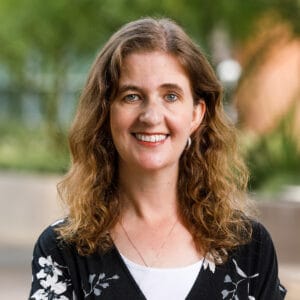In honor of April being World Autism Month, we are featuring Rosa Krajmalnik-Brown, director of the Biodesign Institute Center for Health Through Microbiomes, and the interdisciplinary work focusing on how the microbiome impacts autism symptoms.
Nearly half of all the cells in your body are not actually yours — they are microbes, which work together to support your health. This incredible community is called the microbiome.

At the Arizona State University Biodesign Center for Health Through Microbiomes, researchers explore this microscopic world, find ways to identify and track specific microbes, and harness the power of microbes to improve people’s health.
“My favorite thing about working at Biodesign is the feeling that if you can dream it, you can do it,” says Rosa Krajmalnik-Brown, director of the center.
A key ingredient to this sense of empowerment is the interdisciplinary research culture that the center, and Biodesign as a whole, work to foster.
“As a great example, I am an environmental engineer doing research on the gut microbiome,” says Krajmalnik-Brown, who is also a professor in the School of Sustainable Engineering and the Built Environment.
Through such blends of expertise and close collaborations, the center’s researchers engage their curiosity and make discoveries that have practical applications to help people. The center’s nature-inspired approach to health solutions draws from the overarching mission of the Biodesign Institute, which is celebrating its 20th anniversary throughout 2024.
Below, Krajmalnik-Brown shares her insights into the center’s research. Answers are edited for length and clarity.
Question: What is the research focus of your center?
Answer: Using microorganisms to solve problems in human health and the environment. We are leading research into the connection between gut bacteria and the conditions of autism and obesity and other metabolic issues. Our team creates fundamental knowledge to develop microbe-based health interventions and diagnostics for better human health. Using fundamental microbiomes knowledge, we develop methods to identify and track gut microbes and their products and develop microbial interventions for better human health. We use microbes to diagnose, treat and prevent disease.
Q: Why is this work important to society?
A: Research into the microbiome, a crucial bridge between our diet, environment and our health, will revolutionize medicine. The overarching goal of the center is to manage the human microbiome to transform human health. Microbiome research has shown important contributions to addressing autism, obesity and energy extraction from our food.
Q: What is the biggest challenge in this field of research?
A: There are several. One is defining “normal and healthy” microbiota. Another is being able to perform large longitudinal intervention studies. It’s also a challenge to understand how a human host’s genetic makeup and environmental exposures contribute to the microbiome and how it’s affected by lifestyle choices like diet and exercise.
Q: What is something you consider one of the center’s biggest successes?
A: Showing in clinical settings that by modifying the microbiome we can improve human health. In young patients with autism, we modified the microbiome with microbial transfer therapy, which led to improvements in behavior and digestive health. In another study, we modified the microbiome with a diet designed to send more energy to the gut microbiome, which resulted in changes in energy extraction by the host.
Q: If someone gave your center $100 million, what would you do with it?
A: I and my faculty have many ideas. To share a few, I would raise the salary of all administrative staff, hire additional faculty and staff, and support a graduate student and postdoc for each faculty within the center. I would invest in new equipment to enhance our research capacity and fund pilot projects that will lead to future funding from other sponsors. I would maintain a funded seminar series and pay for visiting scholars to exchange knowledge. And I would create materials for public engagement, like educational tools, games and newsletters, as well as try to get some of our technologies to market. I would provide seed funding for new ideas from our faculty. All of this with the final goal to do translational research that takes our microbiome findings to the public and clinic in a faster way.
Q: How does your center approach nature-inspired research?
A: The research conducted at the center encompasses a wide range of nature-inspired investigations. One avenue of exploration involves addressing autism spectrum disorder through microbial transplant therapy, with a focus on improving intestinal symptoms and related behaviors in autistic patients. Another area of interest delves into understanding how the microbiome influences energetics and metabolism, shedding light on the intricate process of extracting energy from food. Evolutionary perspectives on the microbiome are important to uncover possible disease causes. Additionally, the role of the microbiome in child development can lead to disease prevention and treatment. Finally, type II immunity within the intestinal tract connects the environment and microbes. These diverse research endeavors draw inspiration from nature and aim to illuminate the complex interplay between microbes and human health.
Q: What key events set you on your research path?
A: Good chemistry teachers in middle school, an amazing organic chemistry teacher in high school and inspiring professors in college. Opportunities to do hands-on research were important in my path. I have been doing research since I was an undergraduate.
Q: What is the most fun aspect of your work in the center?
A: Coming to work every day is fun. We have a very positive environment in the center. I love seeing everyone help each other. I especially like working with PhD students and postdocs and collaborating with other professors. I like looking at my students’ data, helping them interpret their results and experiencing how they grow academically and professionally.
